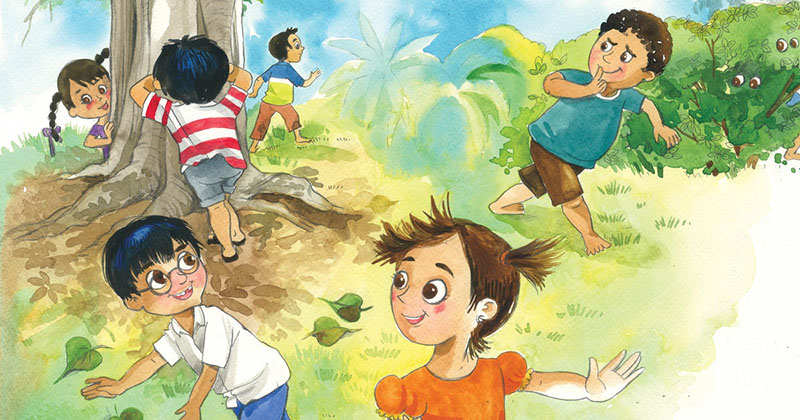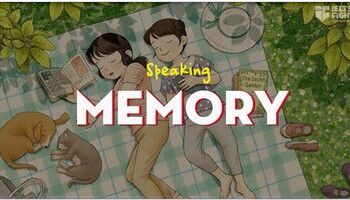Bài học hôm nay chúng ta tìm hiểu chủ đề Memory. Có các câu hỏi part 2 và Part 3 với bài mẫu hướng dẫn trả lời như bên dưới, bạn cùng tham khảo thêm cách triển khai ý nhé.
Speaking Part 2 Sample Memory
Câu hỏi của chúng ta là về thời điểm thơ ấu, ký ức trò chơi, kỷ niệm thời còn nhỏ.
Describe an enjoyable experience in your childhood.
You should say:
- When and where it happened
- Who you were with
- What you did
- How you felt
Sample
When it comes to the question, the first thing springing in my mind is a game ' Hide and Seek'. Playing 'Hide and Seek' was one of the greatest experiences during my childhood.
Hide and Seek is a classic game that involves a group of friends hiding while one person counts down to a certain number, giving everyone else time to find a hiding spot. As a child, I used to play this game with my siblings and neighborhood friends almost every evening after school. To play hide and seek, we would choose a designated "home base" where the person who was "it" would count down. The rest of us would scatter, searching for the most inventive and obscure hiding places we could find. The thrill of finding an extraordinary hiding spot without being detected was incredibly exciting. One aspect of this game that made it particularly enjoyable was the element of strategy and quick thinking. Since the objective was to avoid being found, we had to be strategic in choosing our hiding spots. We would often hide behind curtains, under beds, or even squeeze into tight spaces like closets. It required a combination of creativity and speed to find the perfect hiding place before the seeker finished counting.
For me, playing hide-and-seek allowed me to develop important social skills. It encouraged teamwork and cooperation as we all worked together to find hiding spots or distract the seeker when they got close to discovering someone. Additionally, it helped improve communication among us as we communicated through whispers or hand signals to coordinate our moves during the game.
Vocabulary

Speaking Part 3 Sample
Why do you think some people have better memory than others?
The reasons why some people have better memory than others are multifaceted and can vary from person to person. However, some factors that may contribute to differences in memory ability include genetics, lifestyle choices, and environmental factors. First of all, genetics play a role in determining memory capacity. Studies have shown that genes can influence different aspects of memory, including verbal and spatial memory. Some individuals may inherit genetic variations that enhance their memory abilities, while others may inherit genetic variations that impair their memory function. Lifestyle choices can also affect memory function. For example, research has shown that chronic stress, lack of sleep, and poor nutrition can impair memory function over time. In contrast, engaging in regular exercise, maintaining a healthy diet, and getting adequate sleep can support healthy brain function and improve memory. Finally, environmental factors such as education, occupation, and social engagement influence memory function a lot. Research has shown that individuals who engage in mentally stimulating activities, such as reading, writing, and playing games, have better memory function in later life. Additionally, individuals who have high levels of social engagement and support may have better memory function due to reduced stress and improved mental well-being.
In what situations is it important to remember information very well?
I think there are lots of such situations but I would divide all of them into two main groups. The first group is all kinds of situations in which you need to be accurate just because you have no right to make a mistake. I mean such situations as taking an exam or just being tested on information if you are a student, making a diagnosis if you are a doctor or vet, or navigating a plane if you are a pilot. In all these cases you have to be able to recall all relevant details, especially if you are alone and have no access to anyone or anything. And the second group is all those situations in which you just want to impress other people in order to gain a competitive advantage. For example, when you want to make a more lively and engaging presentation without rummaging through pages of notes and this way build your reputation as an expert in your field.
How can people improve their memory?
Oh, there are many fun, simple and even, I'd say, delicious ways to improve memory. First of all, it's necessary to eat a brain-boosting diet because the brain needs fuel just as much as the body does. What I consider healthy for the brain is lots of fruits and vegetables, whole grains, lean protein and healthy fats such as olive oil, nuts, fish and fish oil supplements. For brain health, though, it's not just what we eat but also what we don't eat matters. So, in order to boost the brain power and memory we should eat less added sugar and cut down on refined carbs such as cakes, cereal, cookies and white bread. Secondly, in order to help our brain and memory stay sharp we should exercise more as physical activity increases oxygen to the brain and reduces the risk for disorders that lead to memory loss. One more important thing for improving the memory is playing, different brain games like crosswords, word-recall games and even mobile app games dedicated to memory training as memory, like muscular strength, requires us to use it or lose it. Well, and of course we should consider such things as getting enough sleep, taking breaks throughout the day, using different tricks such as visualization while memorizing something and setting a healthy balance between work and leisure time as only a combination of all these methods can give us really good results.
Why is it difficult for some people to remember things?
Well, I guess it may be so for a score of reasons. If not to consider age-related memory loss and memory-impairing illnesses such as Alzheimer's disease but focus on memory problems typical for healthy people, I think that one of the most common reasons for forgetfulness is that people are just absentminded and don't pay close enough attention to the things that happen to them. One more reason I can name is emotional disorders such as stress, anxiety or depression and, as a result, sleep disorders that make people take certain medications which can cause forgetfulness and confusion. What else? Well, this may happen because of some kind of vitamin deficiency, and, of course, because of a lack of storage space in the brain as brains of some people are overloaded with tons of information.
What childhood memories do people usually have?
I think people often have a wide range of experiences that leave lasting imprints. For example, they can be the time they played games, explored around their neighborhood, enjoyed family vacations, took part in celebrations, and interacted with friends and siblings. These memories often bring about the feelings of nostalgia, innocence, and joy. On top of that, they are often associated with particular places, people, or significant events that occurred during childhood.
Why do some people remember more of their childhood than others?
I think there are several factors. Firstly, the age at which memories are formed can influence their retention. I mean memories formed during early childhood usually fade more quickly compared to memories formed during adolescence or later stages of childhood. On top of that, the emotional significance of events plays a role in memory retention. For example, I still vividly recalled the time my parents threw a surprise birthday party for me when I was 5, I was over the moon and I still remember that event until now. Furthermore, the frequency of recalling and reflecting upon childhood memories can affect their lastingness.

Trên đây là bài mẫu và một số từ vựng hay chủ đề Memory trong IELTS Speaking. Các bạn cùng thử sức trả lời ghi điểm nhé.
Học thêm với chủ đề hay ở đây nữa nhé:
IELTS Speaking topic Friends
IELTS Speaking Describe an event





